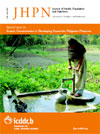
|
The Journal of Health, Population and Nutrition
icddr,b
ISSN: 1606-0997
EISSN: 1606-0997
Vol. 27, No. 4, 2009, pp. 462-476
|
 Bioline Code: hn09046
Bioline Code: hn09046
Full paper language: English
Document type: Research Article
Document available free of charge
|
|
|
The Journal of Health, Population and Nutrition, Vol. 27, No. 4, 2009, pp. 462-476
| en |
Does Level of Social Capital Predict Perceived Health in a Community? - A Study of Adult Residents of Low-Income Areas of Francistown, Botswana
Modie-Moroka, Tirelo
Abstract
This study explores and describes the relationships among neighbourhood characteristics, social capital, and health outcomes among low-income urban residents in Francistown, Botswana. Using an explanatory correlational research design to explore the relationships among the study variables, data were collected from 388 low-income urban residents in Francistown, Botswana. The study further examined the role of social capital on the environmental quality for the overall health and quality of life and the psychological, physical and level of independence domains of health. Several studies have explored these relationships but currently no study has explored this relationship in Africa and Botswana in particular. Selected concepts from social capital theory and stress theory were used as a conceptual framework. Using linear and multiple regression models, results of the study showed that social capital did not correlate with the overall health and quality of life and the level of independence domain of health but positively correlated with psychological well-being. Social capital negatively predicted physical health. Hierarchical moderated multiple-regression analyses were conducted to examine the moderating role of social capital. To the contrary, social capital did not moderate the effects of chronic community stressors on all health outcomes. Social capital, however, moderated the effects of the poor environmental quality on level of independence and physical health outcomes but not on the psychological and overall health and quality of life. These results underscore the importance of considering the role of social capital, especially in low-income communities.
Keywords
Cross-sectional studies; Environmental quality; Health status; Social capital; Social exclusion; Botswana
|
| |
© Copyright 2009 - International Centre For Diarrhoeal Disease Research, Bangladesh
Alternative site location: http://www.jhpn.net
|
|
